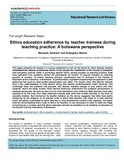Ethics education adherence by teacher trainees during teaching practice: a Botswana perspective

View/
Date
2014-04-10Author
Moswela, B.
Gobagoba, M.
Publisher
Academic Journals: http://www.academicjournals.org/ERRType
Published ArticleMetadata
Show full item recordAbstract
This paper presents the results of a survey conducted to find out the extent to which teacher trainees understand and observe professional ethics. It also sought the contribution of the Faculty of Education and secondary schools make in promoting teacher ethics among trainees on teaching practice. Data were gathered from randomly chosen 90 participants as follows: 70 teacher trainees on teaching practice at schools, 10 school teaching practice coordinators and 10 lectures in the Faculty of Education at the University of Botswana. A predominantly qualitative based empirical approach to data gathering that used an open-ended questionnaire was used. The results show that teacher trainees have a fair understanding of what teacher ethics and teacher professionalism entail. However, this knowledge does not translate into practice. Still teacher trainees indulge in love affairs with their students, which the study reveals. Such teacher behaviour undermines the academic performance of students particularly the girls as they are the most affected by such relations. Male teachers have been reported to be the ones who make advances towards girls more than female teachers to the boys on sexuality matters. Such behaviour by teacher trainees, as the survey suggests, has likely been partly influenced by the absence of an enacted code of ethics that teachers can relate to in their practice which has partly contributed to some teachers to flout professional conduct with impunity. The paper ends by recommending that a code of ethics for teachers is very necessary in order to raise the image of teaching as a vocation and that ethics education should be mandatory to all students of education at the teacher training institutions in Botswana.
